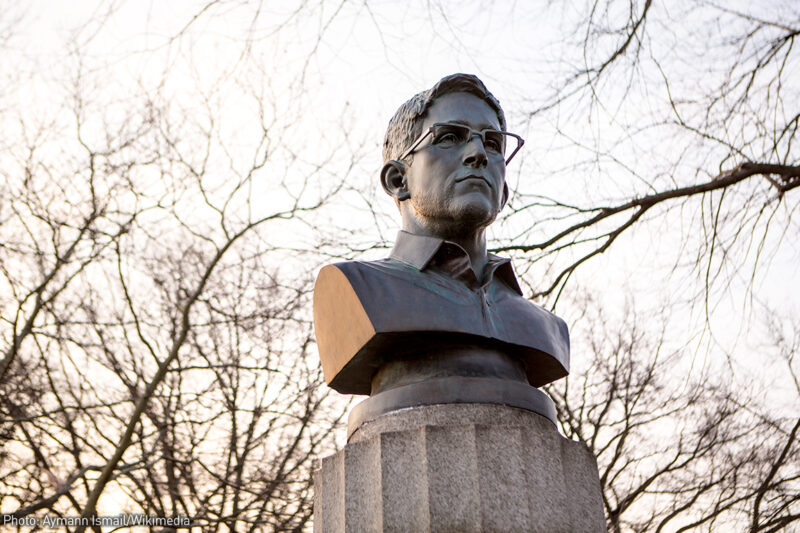
This piece originally appeared at the.
About a year ago, a 30-something sculptor in Los Angeles began working on a bust of Edward Snowden. When he was done, he shipped the bust to his artist friends on the East Coast. Just before dawn April 6, the artists crept under cover of darkness into Brooklyn's Fort Greene Park and installed the 100-pound bust atop a Revolutionary War memorial.
"We chose to pay tribute to Snowden through the medium of a bust because that is one of the visual pieces society uses as a guidepost to who a hero is," one of the artists said in a video released after the bust was installed.
By 3 p.m. the New York Parks Department and police had taken the bust down. But the next morning, a different group of artists cast a holographic image of Snowden where the bust had stood.
The message to the authorities could not be clearer: Snowden is not going away. A large and important segment of our society sees Snowden as hero and whistleblower — and its members are the future.
In late February, the American Civil Liberties Union commissioned a global poll surveying millennials (18- to 34-year-olds) in 10 countries, including the United States, about their opinions of Snowden and what the effect of his disclosures will mean for privacy. The results confirmed that surveillance reform, like marriage equality, will come about because of generational change.
The poll showed that in every country surveyed — Australia, Canada, France, Germany, Britain, Italy, New Zealand, the Netherlands, Spain, and the U.S. — millennials have an overwhelmingly positive opinion of Snowden. In continental Europe, 78 percent to 86 percent has positive opinions of him. Even in the United States, where the Justice Department has charged Snowden with espionage, 56 percent view him favorably.
The poll also found that millennials believe Snowden's disclosures will benefit privacy rights. In Germany, Italy, Spain, and the Netherlands, 54 percent to 59 percent said they thought Snowden's actions would lead to more privacy protection.
It might seem counterintuitive to think that Snowden's disclosures will lead to greater privacy protections when many of the governments in the countries polled are insistent on maintaining or enhancing their abilities to spy on their citizens. Canada, France and the Netherlands are considering expansive surveillance powers similar to the Patriot Act, and Australia already has enacted such a law.
Though surveillance reform may confront resistance in the near term, millennials have made it clear that they don't want government agencies tracking them online or collecting data about their phone calls. In the United States, millennials will surpass the baby boomer generation this year, and by 2020, they will represent 1 out of 3 adults. As they grow in influence, so too will the demand to rein in the surveillance state.
Conventional wisdom says that the young and idealistic grow up and shed their naive ideals as they confront the real world. By that logic, as millennials age, they will recognize the need for the surveillance state to keep us safe from terrorism. But given the lack of evidence that mass surveillance works — President Obama's own review group concluded that the National Security Agency's call-records program never played a pivotal role in any investigation — it is unlikely this generation of digital natives will shed a fundamental commitment to the free exchange of information.
Their ethos — that the Internet should be a place where people are free to share knowledge and ideas without government interference — is already reflected in tech culture. Technology companies, compelled by profit and principle, recognize how governments continue to violate their citizens' trust with secretive surveillance practices, and some have responded by providing encryption measures for their customers to circumvent it. Last month, the Reform Government Surveillance coalition, which includes Google, Apple, AOL, Facebook, LinkedIn, Microsoft, Twitter, and Yahoo, sent a letter to U.S. lawmakers calling for the government to end the bulk collection of data.
It's important to remember how fast even the most entrenched beliefs can change. Not so long ago, the majority of Americans opposed same-sex marriage. In 2003, the Pew Research Center found that 59 percent of the U.S. population opposed same-sex marriage. But that same year, 51 percent of millennials supported it. Since then, support for it has increased every year, in every age group. Federal legalization of same-sex marriage now appears inevitable.
It took about a decade for U.S. policies and laws to catch up to millennials on same-sex marriage. But Congress will have an opportunity to tackle the surveillance issue much faster. In June, key provisions of the Patriot Act are set to expire, including Section 215, which the NSA claims as the legal backing for its bulk collection of Americans' phone call records. Congress should let these provisions expire.
When millennials translate their political ideals into public policy, the future will be more in the spirit of 1776 than 1984, and Snowden will assume his place in American history as whistleblower and patriot. The establishment might not like him now, but one day, it will erect a monument honoring him.

